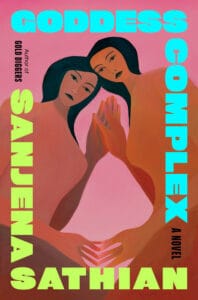In Sanjena Sathian’s new novel, Goddess Complex, women’s bodies are reduced to the idea of their divine if not interchangeable—wombs. The protagonist, Sanjana Satyananda (the stark similarity in names between the author and her character is no coincidence) is a thirty-something burnt-out academic who feels intense alienation toward motherhood. She spends the course of the novel hopping from America to India, trying to stabilise her increasingly volatile sense of self in a world that prizes her fertility and criticises her choices.
Though Sanjana has many external crises—a missing husband, the social pressures of having had an abortion, and a distinct lack of money—her main issue is internal; Sanjana’s individuality seems to be slipping away. “But of late, I was becoming less defined”, she says, rueing the loss of Indian citizenship after her American marriage and realising herself to be in “uncharted terrain”. Her crisis, fuelled by her circumstances, is heightened by those she sees around her. Her friend, Lia, has disavowed “braless summer volunteering” in favour of a fancy job, a boring husband and a baby. Her sister, whom she has never understood, continues down the path of traditional motherhood in a nice house with a garden and a dog — the white picket fence, though unmentioned, is assumed. The modernity of the women around her begins to feel pitiful, as though Sanjana, in rejecting motherhood, has failed to access a deeper, mystical femininity — à la the New-Age, spiritual flavour of late-stage feminism.
As Sanjana drifts aimlessly in America, shuffling between Lia’s home and her sister’s and lingering too long in each, she begins receiving cryptic messages from unknown numbers, all of them alluding to her aborted fetus. One person sends WhatsApp forwarded stock images of well wishes, and another simply texts “👼” before disappearing. The messages are confusing and mildly threatening — who knew about her abortion? Why were they all pretending as though she was pregnant? For Sanjana, all answers lead back to Killian, the husband she had left in Goa.

Killian Bane is a failed actor overcompensating for his whiteness; he attends yoga retreats, has a guru, and insists that he is half-Indian with little evidence to support his claim. After a marriage of convenience — American citizenship for Sanjana, and for Killian, a newfound connection to India (and by extension, his “spirituality”) — the couple relocates to Bombay, setting up the comfortable life of expats. Yet their situation quickly worsens as Killian finds his true calling to be fatherhood, much to Sanjana’s horror. After a brief stint in an eco-retreat, Sanjana leaves Killian for her old life in America.
Back in America, Sanjana is growing aware of a mysterious entity by Killian’s side, someone who, in fleeting photographs, appears to wear her clothes, shares her features, and even bears a strikingly similar name: Sanjena Sathian. Readers with a sharp eye for the tricks of Indian consonants will remember that this name, Sanjena, is the same as that of the author. The new woman has seemingly taken over Sanjana’s life “as though she had sprung from me the day I turned my back on that old life.”
Sanjana begins to obsess over the new woman, eventually travelling to a strange commune of women in Pune—the titular “Goddess Complex”—to find her. The second half of the novel, introduced with a quote from Dostoevsky— “Mr Golyadkin did not want only to run away from himself, but to obliterated, to cease to be, to return to dust” — unites the two women in a fever dream narrative, replete with mirrors and a distinct lack of boundaries. Though Sanjana believed Killian was by Sanjena’s side (hence her journey to the Goddess Complex), he is curiously missing, adding another layer of mystery to a novel that often asks more questions than it has time to answer.
Sanjana’s quarter-life crisis is fuelled by her relative instability, her decision to shun motherhood and all the key markers of adulthood that come with it. “I knew that purposelessness was dangerous. I feared the self-annihilation that comes from not knowing why you are alive, from seeing your life add up to nothing”, Sanjana says, self-aware but still unable to claw her way back to a stable identity.
As the identities of characters begin to crumble, the distinction between the author, character, and reader also suffer a dizzying collapse. To convey Sanjana’s internal crisis, the novel offers a deftly executed meta collapse of structure: Which Sanjana is writing this? The author, the protagonist, or the clone? What’s the difference between them?
Goddess Complex, propelled by its protagonist, is a millennial novel; girl-bosses litter the background, the de-stigmatisation of casual sex prevails, and the buzzwords of astro-feminism are abundant. Pune’s Goddess Complex offers a physical embodiment of these themes, with inhabitants that run “mommy blogs” and ritually cleanse their chakras.
Sathian’s focus is on women undone by the weight of motherhood, those who have shunned it and those who pray to reach it. Goddess Complex is messy by design, accurately capturing the rapid unspooling of threads that form Sanjana’s life with comedy and creepiness (read: “mommy cult”). For all the mirror imagery the novel employs, the largest reflection is that of a generation reeling from the wins and failures of fourth-wave feminism.


You must be logged in to post a comment.